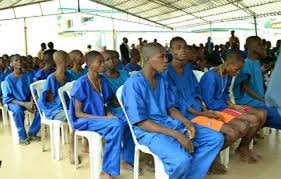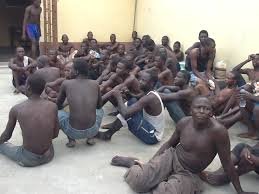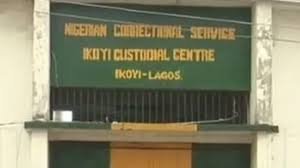Bribery, VIP Treatment Deepening Crises/Scandal
Often, narratives about Nigerian Prisons or properly stated, Correctional Centres are emitting highly reprehensible vicious activities that unfortunately mirror the country before her peers in the comity of nations. Juliet Jacob, taking as a case study the recent controversy involving a popular transgender based in Lagos, South West Nigeria, looks deeper into the rots in the nation’s prisons and justice system.
Corruption within Nigeria’s justice system has continued to erode public trust, hinder reform efforts, and undermine crime prevention strategies. Two of the most critical institutions impacted by corruption recently are the Nigerian Correctional Service (NCS) and the Economic and Financial Crimes Commission (EFCC). This report delves into how corruption has seeped into these key organizations, obstructing their mandates and weakening the country’s justice system.
Nigerian Correctional Service (NCS)

The Nigerian Correctional Service is tasked with the rehabilitation of offenders and the management of prison facilities across the country. However, systemic corruption has greatly tarnished its reputation, hindering its role in upholding justice. The following are some of the primary areas where corruption has taken root within the NCS:
Bribery and Special Privileges for Inmates

In Nigerian prisons, inmates with financial resources are often able to bribe officials to receive better treatment. This includes access to more comfortable living conditions, contraband items such as drugs, mobile phones, and even alcohol. Wealthy inmates are placed in superior cells, while poorer inmates are left to endure overcrowded, unsanitary conditions. This deep inequality reflects the broader societal divide fostered by corruption.
Controversy Erupts Over Bobrisky’s Jail Term Amid Bribery Allegations
A shocking audio recording released by social media influencer and human rights activist, Very Dark Man (Vincent Otse), has reignited controversy surrounding Bobrisky’s six-month jail term for mutilating the naira.
The recording allegedly captures Bobrisky claiming he served his sentence in a private apartment, not in prison, after bribing prison officials. This startling revelation has sparked outrage and raised questions about potential corruption and special treatment.



According to the audio, Bobrisky also boasted about paying N15 million to Economic and Financial Crimes Commission (EFCC) officials to drop money laundering charges against him.
The allegations have ignited widespread condemnation, with many calling for investigations into the claims. The EFCC and prison authorities have yet to come clean on the matter. Bobrisky’s representatives have also remained silent. The controversy has cast a spotlight on Nigeria’s justice system, highlighting concerns about corruption and unequal treatment of citizens.

Misappropriation of Funds
Funds allocated for the upkeep of prisons, as well as the welfare and rehabilitation of inmates, are often diverted by corrupt officials. Investigations have exposed that money meant for essentials like food, healthcare, and rehabilitation programs is frequently siphoned off. As a result, many prison facilities lack basic necessities, leaving inmates without adequate food, clean water, or medical attention.
Corruption incorporated
Corruption is not new in the system. It will be recalled that Nigerian government proposed a budget of N22.44 billion for feeding inmates across the country in 2022.
This allocation is part of the Federal Government’s executive proposal in the 2023 Appropriation Bill, which also sets aside N304.39 billion for the Ministry of Interior. The Nigeria Correctional Service will receive N91.79 billion, while the Ministry of Interior headquarters will get N2.66 billion.
As of October 17, 2022, the total inmate population stands at 76,203, comprising 74,574 males and 1,629 females. Convicted inmates make up 30% of the total population, with 22,742 males and 389 females, while awaiting trial inmates account for 70%, with 51,832 males and 1,240 females.
However, the proposed allocation has raised concerns about its effectiveness, as some inmates have reported that despite previous increases in feeding allowances, they still do not receive adequate meals which speaks volumes of monumental corruption going on in the service.
Critics argue that the N22.44 billion allocation may not be enough to provide satisfactory feeding conditions for inmates, highlighting or the country has been fleeced by some corrupt individuals and the need for more efficient management of resources.
Corruption in Recruitment and Promotion
Recruitment within the NCS is rife with bribery and nepotism. Potential officers are often required to pay bribes or have influential connections to secure employment. This has led to the hiring of unqualified personnel, further undermining the effectiveness of the service. Promotions within the NCS are similarly influenced by bribery, with many less competent officers advancing while merit and ability are ignored.
Collusion with Criminal Networks
One of the most troubling aspects of corruption in the NCS is the alleged collusion between prison officials and criminal networks. Reports have surfaced that officials facilitate the escape of high-profile inmates or enable them to continue their criminal activities from within the prison walls. This undermines public trust in the justice system and compromises national security.
The Economic and Financial Crimes Commission (EFCC)
The EFCC was established to combat financial crimes such as corruption, money laundering, and fraud. While the agency has achieved notable successes, corruption within its ranks is increasingly undermining its ability to execute its mandate effectively.
Compromised Investigations and Selective Justice
One of the most damaging allegations facing the EFCC is that it often engages in selective justice. Powerful political figures and wealthy individuals are sometimes shielded from investigation or prosecution through corrupt practices. In some cases, investigations are stalled or files conveniently “lost” to protect influential individuals. This has led to accusations that the EFCC is used as a tool for settling political scores, rather than impartially serving justice.
Bribery in Case Handling
Numerous EFCC officials have been implicated in bribery scandals. High-profile suspects and defendants have reportedly paid significant bribes to have charges dropped or investigations halted. This practice compromises the commission’s credibility and undermines the fight against financial crimes. In some cases, politicians, business moguls, and public officeholders have had their cases quietly shelved after deals with corrupt EFCC officers.
Mismanagement of Recovered Assets
The EFCC is tasked with recovering assets acquired through corrupt or fraudulent means. However, allegations abound that these recovered assets, which include money, vehicles, and real estate, are often mismanaged or fraudulently sold off. In some instances, officials are accused of embezzling these recovered funds, perpetuating a cycle of corruption even within the agency.
Internal Corruption
Internal corruption within the EFCC itself is a growing concern. Senior officials have been implicated in embezzlement, manipulation of promotions, and favoritism, further eroding the commission’s effectiveness. These issues have created a toxic work environment where personal gain often takes precedence over integrity.
Case Study: Allegations of Corruption in the Bobrisky Bribery Scandal
The recent scandal involving popular figure Bobrisky has shed light on the pervasive corruption in both the EFCC and the NCS. In a case that has gripped public attention, Bobrisky was sentenced to six months in prison for the abuse of the Nigerian naira. However, allegations emerged that he paid a N15 million bribe to EFCC officials to have money laundering charges dropped, and he reportedly served his sentence in a VIP facility rather than a regular prison.
An audio recording, made public by social activist VeryDarkMan, further fueled the scandal, suggesting collusion between EFCC officials and prison authorities to grant Bobrisky preferential treatment. Following these revelations, the House of Representatives launched an investigation and summoned top officials, including the EFCC Chairman Ola Olukoyode and NCS Comptroller General Haliru Nababa, along with key officers involved in the case.
The inquiry is expected to uncover the extent of corruption in the handling of Bobrisky’s prosecution and sentencing.
The Path to Reform
Reforming both the Nigerian Correctional Service and the EFCC is essential for restoring public trust and ensuring that these institutions can fulfill their mandates effectively. Key recommendations include:
- Strengthening Internal Oversight:
- Both institutions require independent oversight bodies with the power to investigate and prosecute internal corruption.
- Improving Welfare and Conditions: Enhancing salaries and working conditions for prison officers and EFCC staff could reduce the temptation to engage in corrupt practices.
- Digitalizing Processes: Implementing digital systems for case management, asset recovery, and prison administration could reduce opportunities for corrupt behavior.
- Ensuring Public Accountability: Regular public reporting on the activities of the EFCC and NCS would increase transparency and help rebuild trust in both institutions.
Without urgent reforms, the pervasive corruption in the Nigerian Correctional Service and the EFCC will continue to undermine the entire justice system, leaving Nigeria’s fight against crime and corruption weakened.



